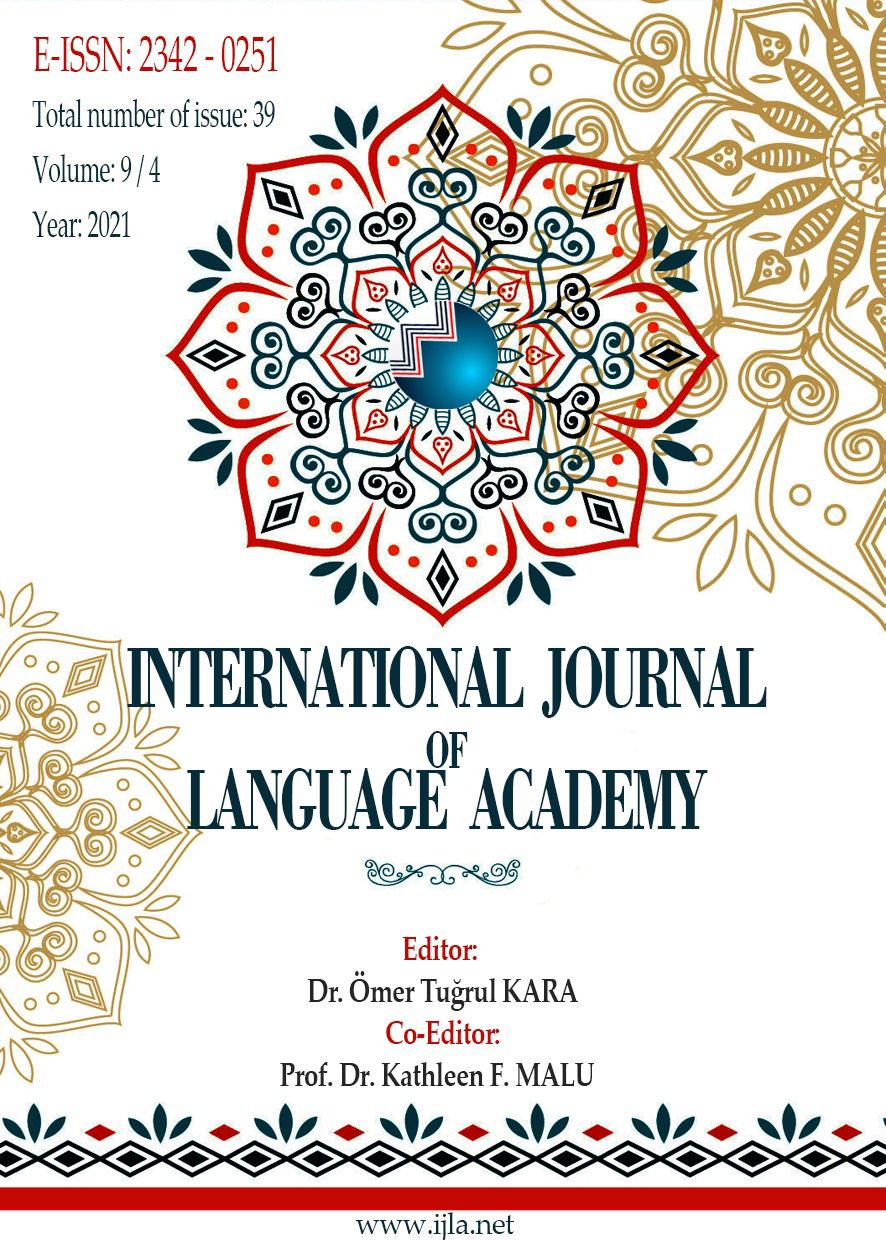NGUGİ WA THIONG’O’NUN PETALS OF BLOOD ADLI ROMANININ NEO-KOLONYAL UYGULAMALAR IŞIĞINDA TEMATİK OLARAK İNCELENMESİ
Author :
Abstract
İlk üç romanında Kenya’nın sömürü altındaki toplumsal dokusunu tasvir eden Thiong’o, dördüncü romanı Petals of Blood’da, Kenya’nın sömürü döneminden sonraki toplumsal yapısını gözler önüne sermektedir. 1977’de yayımlanan roman, bağımsızlıktan sonra Kenya’nın ekonomik ve sosyal yapısının bir portresini çizmekte, özellikle de toplumun büyük bir kısmını oluşturan işçi ve köylü sınıfının yabancı sermayeli şirketlerle işbirliği içindeki açgözlü yerli burjuvazi ve siyaset sınıfı tarafından nasıl sömürülmeye devam edildiğini anlatmaktadır. Thiong'o, romanlarında hep Kenya toplumunun adaletsiz ekonomik yapısının ve onun dünya ekonomisiyle olan eşitsiz ilişkisinin birçok toplumsal rahatsızlığının teme l nedeni olduğunu göstermeye odaklanan bir yazar olarak bilinmektedir. Neokolonyalizm, emperyalizmin 1970'lerden sonra ortaya çıkan yeni ve farklı bir uygulaması olarak bilinir. Başka bir deyişle, sömürgelerin bağımsızlığını kazanmasından sonra bile emperyalist sömürüleri gizli bir şekilde sürdürmek için işleyen yeni bir sömürgeci baskı biçimi olarak tanımlanabilir. Thiong’o’nun, Kenya’nın bağımsızlığından sonra yazdığı romanları genel olarak yeni -sömürgeci uygulamalara ve politikalara odaklıdırlar. Thiong’o, bu romanda da, büyük fedakârlıklarla elde edilen bağımsızlığın kapitalist çıkarlarla gizli anlaşma içindeki yeni -sömürgeci (neo-colonial) seçkinler tarafından heba edildiğini kurgusal bir söylemle anlatmakta ve halkın neo-kolonyal uygulamalarla mücadele edebilmesi için yapılması gerekenleri Fanonist bir bakış açısıyla dile getirmektedir. Bu düzlemden hareketle, bu makale Thiong’o’nun neo-kolonyal politikalarla mücadele etmek için öne sürdüğü tematik argümanları ortaya çıkarıp iç ve dış sömürüye kar şı bir farkındalık oluşturmayı amaçlamaktadır.
Keywords
Abstract
Fictionalizing the colonized social fabric of Kenya in his first three novels, Thiong'o reveals the social structure of Kenya after the colonial period in his fourth novel Petals of Blood. Published in 1977, the novel presents a portrait of Kenya's economic and social structure after independence, particularly how the working class and the peasants, which constitute a large part of the society, continue to be exploited by the greedy local bourgeoisie and political class in collaboration with foreign-owned companies. Thiong'o is renowned as a writer who constantly focuses on demonstrating that Kenyan society's uneven economic structure and its unequal ties with the global economy are the core causes of numerous social evils. Neo-colonialism, which emerged around the 1970s, is known as a new and different form of imperialism. In other words, it can be defined as a new form of colonial oppression
that operates to covertly perpetuate imperialist exploits even after the colonies gained independence. Thiong'o's novels written after Kenya's independence are generally focused on neo-colonial practices and policies. In this novel, too, Thiong'o narrates how the independence gained through great sacrifices is squandered by neo-colonial elites in collusion with capitalist interests and expresses, from a Fanonist perspective, what needs to be done in order for the public to be able to resi st neocolonial practices. From this point of view, this article aims to reveal the thematic arguments put forward by Thiong'o to combat neo-colonial policies and raise awareness against domestic and foreign exploitation
Keywords
- Boehmer, E. (2005). Colonial and postcolonial literature. New York: Oxford University Press.
- Fanon, F. (1967). On national culture. New York: Groove Publishers.
- Fanon, F. (1988). Towards the African revolution: political essays. (Çev. Haakon Chevalier). New York: Grove Press.
- Gikandi, S. (1996). Maps of Englishness: writing identity in the culture of colonialism. New York: Columbia University Press.
- Halperin, S. (2020). Neocolonialism. Encyclopedia Britannica. https://www.britannica.com/topic/ neocolonialism.
- Kumar Nag, S. (2013). Fighting neocolonialism: A case study of the selected novels of Ngugi Wa Thiong’o. Epiphany (ISSN 1840-3719): Vol. 6, No. 1.
- Masilela, N. (1979). Ngugi wa Thiongo’s Petals of Blood. Ufahamu: A Journal of African Studies. California Digital Library. http://escholarship.org/content/qt5z69c888/qt5z69c888.pdf. Erişim Tarihi: 21 12 2016.
- Nkrumah, K. (1974). Neo-colonialism: The last stage of imperialism. Bedford: Panaf.
- Pozo, M. A. (2004). An interview with Ngugi Wa Thiong'o. http://www.postcolonialweb.org/ poldiscourse/pozo3.html>
- Thiong’o, N. W. (1972). Homecoming: Essays on African and Caribbean Literature, Culture and Politics. London: Heinemann.
- Thiong’o, N. W. (1977). Petals of Blood. London: Heinemann.
- Thiong’o, N. W. (1981). Writers in politics: Studies in African literature. Nairobi: East African Publishers
- Thiong'o, N. W. (2011). Decolonising the mind: The politics of language in African literature . London: James Currey Ltd / Heinemann.
- Uwasomba, C. (2006). “The politics of resistance and liberation in Ngugi wa Thiong’o’s Petals of Blood and Devil on the Cross,” The Journal of Pan African Studies, volume:1, no: 6, p. 94-105.
- Williams, P. (1999) .Ngũgĩ’s wa Thiong’o. Manchester: M U P.





